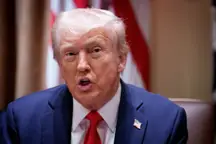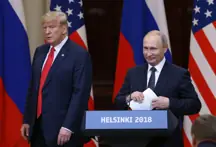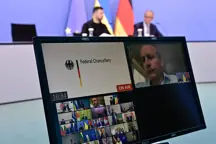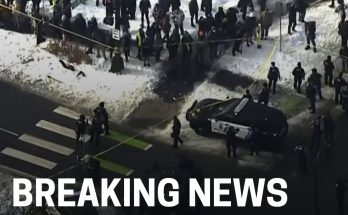Donald Trump has issued a stark warning to Vladimir Putin ahead of their highly anticipated meeting in Alaska.

The two presidents are scheduled to have a face-to-face meeting in Alaska on Friday (August 15), to explore options for a ceasefire in the three-and-a-half-year-old conflict between Russia and Ukraine.
While Trump has not detailed what consequences Russia might face, he hinted at the possibility of sanctions or tariffs if they refuse to budge.
Asked by reporters whether consequences would follow if Putin rejects calls to stop the war, Trump said: “Yes, they will.” Pressed further, he added: “I don’t have to say, there will be very severe consequences.”
Despite the threat, the 79-year-old said the Alaska summit is meant to “set the table” for a second meeting that could involve Ukrainian President Volodymyr Zelenskyy.
“If the first one goes okay, we’ll have a quick second one,” Trump said. “I would like to do it almost immediately, and we’ll have a quick second meeting between President Putin and President Zelenskiy and myself, if they’d like to have me there.”

The warning follows a virtual meeting between Trump, European leaders, and Zelenskyy, hosted by German Chancellor Friedrich Merz, during which Western leaders outlined clear red lines for the Alaska talks.
French President Emmanuel Macron said the 47th president had affirmed two key principles.
“President Trump was very clear that the United States wanted to achieve a ceasefire at this meeting in Alaska,” Macron shared. “The second point on which things were very clear… is that territories belonging to Ukraine cannot be negotiated and will only be negotiated by the Ukrainian president.”
Merz added that, should Russia fail to move toward peace, “the United States and we Europeans should… increase the pressure”.
Still, tensions loom as Russian forces have launched a sharp offensive in eastern Ukraine – a move seen by Kyiv as an attempt to strengthen Moscow’s position ahead of the summit.
“I told the U.S. president and all our European colleagues that Putin is bluffing,” Zelenskyy said, per Reuters. “He is trying to apply pressure before the meeting in Alaska along all parts of the Ukrainian front. Russia is trying to show that it can occupy all of Ukraine.”
Zelenskyy remains unwavering in his opposition to any territorial concessions. Speaking earlier this week, he said: “We will not leave Donbas. We cannot do this. Everyone forgets the first part; our territories are illegally occupied.”
The Ukrainian president has also warned repeatedly that any deal excluding Ukraine would be illegitimate. “These are dead solutions, they will never work,” he said in a recent message on Telegram. “Ukrainians will not give their land to the occupier.”

The Kremlin’s demands remain unchanged: a full Ukrainian withdrawal from four regions Russia has partially occupied and a formal commitment that Ukraine will abandon its bid to join NATO. Kyiv has firmly rejected these terms as unacceptable.
Meanwhile, Trump has expressed growing frustration with Putin’s reluctance to engage. His envoy recently reported “great progress” during talks in Moscow, a shift from weeks of stalled diplomacy.
European leaders, wary of appearing combative toward Trump, have cautiously welcomed his mediation efforts, while emphasizing that no decision should be made without Ukraine’s full involvement.
Polls suggest that while a majority of Ukrainians (69%) support a negotiated end to the war, most are not willing to accept peace at the cost of territory.
The Alaska summit will test whether Trump can push the Russian leader toward compromise, or whether it will harden divides and raise the risk of escalation in a conflict between the European nations.


